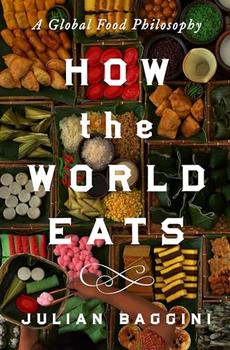
A Global Food Philosophy
by Julian Baggini
From the bestselling author of How the World Thinks, an exploration of how we grow, make, buy and eat our food around the world—and a proposal for a global philosophy of food.
How we live is shaped by how we eat. You can see this in the vastly different approaches to growing, preparing and eating food around the world, such as the hunter-gatherer Hadza in Tanzania whose sustainable lifestyle is under threat in a crowded planet, or Western societies whose food is farmed or bred in vast intensive enterprises. And most of us now rely on a complex global food web of production, distribution, consumption and disposal, which is now contending with unprecedented challenges.
The need for a better understanding of how we feed ourselves has never been more urgent. In this wide-ranging and definitive book, philosopher Julian Baggini expertly delves into the best and worst food practises in a huge array of different societies, past and present. His exploration takes him from cutting-edge technologies, such as new farming methods, cultured meat, GM and astronaut food, to the ethics and health of ultra processed food and aquaculture, as he takes a forensic look at the effectiveness of our food governance, the difficulties of food wastage and the effects of commodification.
Extracting essential principles to guide how we eat in the future, How the World Eats is a thought-provoking and illuminating call for a pluralistic, humane, resourceful and equitable global food philosophy that will guide us towards a food system fit for the twenty-first century and beyond.
"British philosopher Baggini pivots from contemplating the meaning of existence to the more mundane habit of eating. Yet he applies the same intellectually rigorous analysis, and his deep research shines on every page. In this wide-ranging book, Baggini surveys how different societies define food, from the Maasai people in East Africa who thrive on meat, milk, and the blood of their cattle to industrialized Westerners who relish fast food." —Booklist (starred review)
"Baggini skillfully captures the intricacies of an enormously complex system and its tangled environmental, economic, and public health consequences, though his tendency to entertain and then dismiss solutions as insufficient can become tedious. Nevertheless, it's a worthwhile consideration of a pressing social issue." —Publishers Weekly
"A provocative, intelligent survey of the many complexities, moral and practical, of bringing food to our plates." —Kirkus Reviews
"A refreshingly balanced and nuanced survey of the complexities and realities of food today. Baggini explores the global reach of what we eat and weighs up competing voices to give some clarity of thinking amongst the clamor and crises." —Hattie Ellis, author of What to Eat: 10 Chewy Questions About Food
"Very informative and highly enjoyable." —Ha-Joon Chang, SOAS University of London, author of Edible Economics
This information about How the World Eats was first featured
in "The BookBrowse Review" - BookBrowse's membership magazine, and in our weekly "Publishing This Week" newsletter. Publication information is for the USA, and (unless stated otherwise) represents the first print edition. The reviews are necessarily limited to those that were available to us ahead of publication. If you are the publisher or author and feel that they do not properly reflect the range of media opinion now available, send us a message with the mainstream reviews that you would like to see added.
Any "Author Information" displayed below reflects the author's biography at the time this particular book was published.
Julian Baggini's books include the internationally bestselling How the World Thinks; How to Think Like a Philosopher; The Virtues of the Table; and The Pig That Wants to be Eaten. He is the Academic Director of the Royal Institute of Philosophy and is a member of the Food Ethics Council. He is a regular columnist for The Guardian, Prospect magazine, Financial Times and a columnist and book reviewer for The Wall Street Journal. He has also written for New Humanist magazine, The Week, New Statesman, New York Times and Literary Review.
To limit the press is to insult a nation; to prohibit reading of certain books is to declare the inhabitants to be ...
Click Here to find out who said this, as well as discovering other famous literary quotes!
Your guide toexceptional books
BookBrowse seeks out and recommends the best in contemporary fiction and nonfiction—books that not only engage and entertain but also deepen our understanding of ourselves and the world around us.